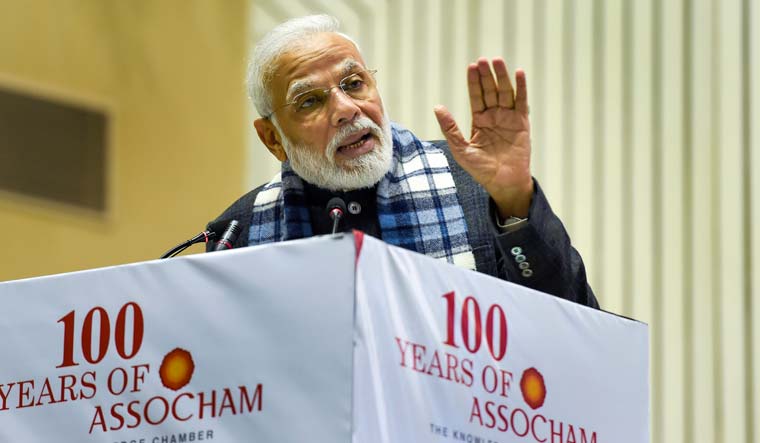Amid signs of deepening slowdown, the government sought industry's support to achieve its target of creating a 5 trillion dollar economy. Prime Minister Narendra Modi said his government was responsive to the needs of the Industry and was willing to look into its suggestions.
Modi listed a number of measures taken by his government to help in ease of doing business which includes lesser control, less corporate tax, removing penal provisions of the several laws and better labour laws. “We brought in fundamental changes in India’s economy so that it can run with set rules in a disciplined manner. We have met with the decades-old demands of the industrial sector and we have built a strong foundation for a 5 trillion dollar economy”
“Now instead of several weeks it merely takes a few hours to register a new company. Automation is helping quick Trading across borders. Better linking of Infrastructure is reducing the turn-around time at Ports and Airports. And these are all examples of a modern economy,” Modi said speaking at a conference organised by industry body Assocham.
Modi said that the idea of making India a 5 trillion dollar worth economy is not a sudden one. “Five years before, the economy was heading for disaster. Our government not only stopped this but also brought in a discipline in the economy.”
Also read
- Takers, not makers: How colonialism secured a global wealth rive
- Food inflation, sluggish credit growth, low corporate funding...: Can the budget revive the growth party?
- UN report on world economic growth: Predictions for 2025
- Rural poverty rates declined below 5% in FY2024, urban poverty too fell: Report
Almost as a contradiction, when Fitch Ratings on Friday cut India's GDP growth forecast for 2019-20 fiscal year to 4.6 per cent on deterioration in business and consumer confidence, the country's equity index Sensex and Nifty scaled new highs.
Referring to the slowdown, IMF's chief economist Gita Gopinath said there has been slowdown in the private sector, so India needs to main maintain fiscal deficit target.
Speaking at the FICCI event, she said, “For India, macro stability is very important, which means stability on the fiscal front. A clear sense of keeping to the target of fiscal consolidation is very important. That would require increasing revenue mobilisation and also rationalising expenditure.
She added that another source of the problem lies with the rural income growth and noted that direct income support to farmers may not help much till the time productivity of Indian agriculture is raised.
On being asked if the current slowdown in Indian economy was cyclical or structural, she said generally both move very closely, particularly for a developing economy that is undertaking deep reforms which are structural in nature. The prolonged weakness in investment needs to be fixed by addressing the problem on financing side.
For India's manufacturing to achieve 25 per cent share in GDP from its current level of 16-17 per cent, the country needs more reforms particularly in land acquisition and labour laws, she added.
The government is hopeful that the situation will improve by next quarter. Echoing the prime minister's sentiment, commerce and industry minister Piyush Goyal stressed for continued dialogue between the government and the industry. He said his ministry had taken a number steps to help remove restrictive provisions. “It may be the smallest of issues or huge road blocks but Indian industry must help the government to navigate through all of these in order to take forward the India growth story,” Goyal said.
"The stakeholders need to tell me, which country is using any trade remedial measures or non-tariff barrier which impacts their exports to the country. Our government is willing to stand by you and look at retaliatory actions and impose similar trade remedial measures."
Talking about the RCEP, Goyal said Modi had taken a bold step which was in favour of the Indian industry. The minister said he was reviewing all the Free Trade Agreements which were hampering exports from India, though it was a time consuming effort.
“The $5 trillion economy is doable, is possible and shall be done. That's our commitment to each one of you," Goyal said adding every downturn is a great opportunity for businesses to prepare for better time. He also stressed that industry and government should invest in research.
“Compared to other countries, India’s investment in R&D is a fraction of India’s GDP; it has remained constant at around 0.6 to 0.7 per cent of India’s GDP. This is below the expenditure of countries like the US (2.8), China (2.1), Israel (4.3) and Korea (4.2),” the minister said.
Transport minister Nitin Gadkari said there was no dearth of money for his ministry. While listing measures taken by his ministry, Gadkari said it has saved approximately Rs 16,000 crore in land acquisition cost by taking a different alignment by acquiring land in tribal and rural areas of Rajasthan for Delhi- Mumbai corridor. The alignment has also resulted in a reduction of 120 km of the route, thereby reducing logistics cost on the Delhi-Mumbai corridor.



